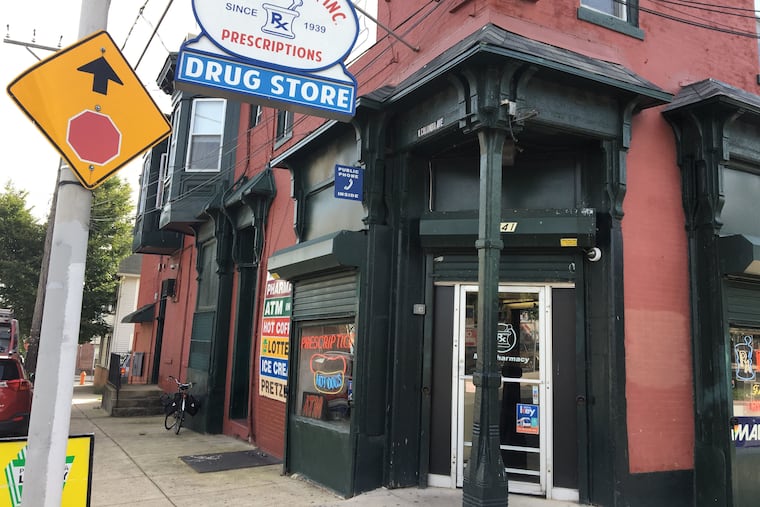One of the last great corner drug stores thrives in North Philly | Inga Saffron
Having survived demographic change, social upheavals, deindustrialization, the 80-year-old independent drug store is now bracing for gentrification.

Philadelphia is famously known as a city of rowhouses. But it is also a city of corner stores. Or, it was. The incursion of national drug chains, shifting demographics, zoning restrictions and, ironically, the current rowhouse boom have turned the neighborhood institution into an endangered species.
In spite of those disruptions, the M.D. pharmacy at Cecil B. Moore and North Franklin carries on as if nothing had changed since Morris Mogilefsky opened the business in 1939, when the surrounding Ludlow neighborhood was a thriving Jewish enclave. As Jews began leaving for the suburbs after World War II, African Americans and Latinos moved in. Then the upheavals of the ‘60s, the deindustrialization of the ‘70s and the crack epidemic of the ‘80s took their tolls on the neighborhood. Yet the drug store somehow stood fast, an outpost of normalcy where you could grab a pretzel, a lottery ticket, and some conversation while waiting for your prescription to be filled.
For a time, the pharmacy was one of the few structures left standing on its block. After the area was rebuilt by the Philadelphia Housing Authority and Asociación Puertorriqueños en Marcha in the early 2000s, the red brick rowhouse became the lone Victorian relic on a street of pale gray, porch-fronted twins.
You enter M.D. pharmacy as all neighborhood stores should be entered, from a door tucked under a corner eave and bisected by a cast iron pole. That pole is topped with a crown of brackets, the equivalent of a classical capital. It supports an elaborate millwork composition that suggests the building dates from the late 19th century. Painted a traditional hunter green, the wood trim stands out sharply from the brick.
Mark Mogil, the current owner and grandson of the founder, started working in the store in 1994, when he was 28, and he has been content to leave things mostly as he found them. Three decades after Columbia Avenue was renamed in honor of civil rights lawyer Cecil B. Moore, the old blue-and-white street plate is still screwed into the wood. A sign promising a public phone also continues to wave to passersby even though that convenience disappeared years ago. You can, however, buy an adapter for your cellphone in a rainbow of colors.
Mogil’s design approach is sedimentary. He’s kept the shelves he inherited from father and grandfather, the ones with sections designated for Kodak film and baby needs, but has layered on a few of his own innovations, including a hot dog station, named Joe’s Grill after his father.
The operation, which takes up the ground floor of the old rowhouse, is roughly equal in size to two aisles in a Rite Aid or CVS. The waiting area for the pharmacy manages to accommodate an ice cream freezer, soda machine, coffee station, and chairs where customers can sit while they wait for service.
Apart from the security cameras and bulletproof glass Mogil installed after an armed robbery in 2009, he hasn’t felt compelled to add much in the way of modern technology. “We don’t have voice mail; we don’t have a website. We don’t have a mobile app. We just answer the telephone,” Mogil says. The store also delivers.
Given his old-school approach, it’s not surprising that Mogil still stocks newspapers (the Daily News and Philadelphia Tribune), refills SEPTA cards, sells stamps, and rents a wall of brass-trimmed post office boxes. One concession to modern times is that Mogil now stocks CBD oil and gummies near the PEZ dispensers and fresh cookies. So far, though, CBD sales have been slow, Mogil says.
The secret to the store’s survival, Mogil told me, is “accessibility and reliability.” He’s there weekdays from 9 to 5, and Saturdays from 9 to 1, every day except holidays. Ten employees staff the counters to ensure quick service. All get health insurance and 17 days of paid vacation.
Personal interactions are also key. The same crew of workers from the nearby PGW office has been trooping in every morning for lottery tickets for the last five or six years — “ever since someone hit the jackpot here,” explains Ryan Campbell, who handles dispute resolution for the gas company. Photos of the regulars fill a bulletin board between the soda machine and coffee station. And there are the kind of jokey signs you’d expect in a corner store, like the one instructing patrons how NOT to fill out their lottery tickets.
There was a time when corner stores like M.D. pharmacy were on nearly every block in Ludlow, Mogil says. Several closed after their owners died. Others succumbed to the housing boom that has been working its way up from Girard Avenue. Fishtown is pushing west toward Mogil’s store, while Temple’s campus is moving east. There’s so much money to be made from the new, student-focused triplexes that developers are reluctant to give up the ground floor for retail.
Mogil finds it hard to imagine that his children will want to take over the business. Then again, he never expected he would still be running a tiny independent pharmacy, and serving up prescriptions and pretzels, well into the 21st century.